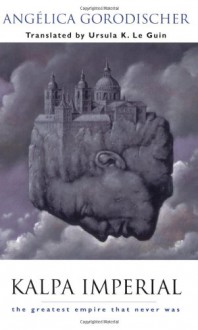This is the first of Argentinean writer Angélica Gorodischer's nineteen award-winning books to be translated into English. In eleven chapters, Kalpa Imperial's multiple storytellers relate the story of a fabled nameless empire which has risen and fallen innumerable times. Fairy tales, oral...
show more
This is the first of Argentinean writer Angélica Gorodischer's nineteen award-winning books to be translated into English. In eleven chapters, Kalpa Imperial's multiple storytellers relate the story of a fabled nameless empire which has risen and fallen innumerable times. Fairy tales, oral histories and political commentaries are all woven tapestry-style into Kalpa Imperial: beggars become emperors, democracies become dictatorships, and history becomes legends and stories. But this is much more than a simple political allegory or fable. It is also a celebration of the power of storytelling. Gorodischer and translator Ursula K. Le Guin are a well-matched, sly and delightful team of magician-storytellers. Rarely have author and translator been such an effortless pairing. Kalpa Imperial is a powerful introduction to the writing of Angélica Gorodischer, a novel which will enthrall readers already familiar with the worlds of Le Guin.Selected for the New York Times Summer Reading list.* "The dreamy, ancient voice is not unlike Le Guin's, and this collection should appeal to her fans as well as to those of literary fantasy and Latin American fiction."—Library Journal (Starred Review)"There's a very modern undercurrent to the Kalpa empire, with tales focusing on power (in a political sense) rather than generic moral lessons. Her mythology is consistent—wide in scope, yet not overwhelming. The myriad names of places and people can be confusing, almost Tolkeinesque in their linguistic originality. But the stories constantly move and keep the book from becoming overwhelming. Gorodischer has a sizeable body of work to be discovered, with eighteen books yet to reach English readers, and this is an impressive introduction."—Review of Contemporary Fiction"Borges and Cortázar are alive and well."—Bridge Magazine"Those looking for offbeat literary fantasy will welcome Kalpa Imperial: The Greatest Empire That Never Was, by Argentinean writer Angélica Gorodischer. Translated from the Spanish by Ursula Le Guin, this is the first appearance in English of this prize-winning South American fantasist."—Publishers Weekly"It's always difficult to wrap up a rave review without babbling redundant praises. This time I'll simply say "Buy this Book!""—Locus"The elaborate history of an imaginary country...is Nabokovian in its accretion of strange and rich detail, making the story seem at once scientific and dreamlike."—Time Out New YorkKalpa Imperial has been awarded the Prize "Más Allá" (1984), the Prize "Sigfrido Radaelli" (1985) and also the Prize Poblet (1986). It has had four editions in Spanish: Minotauro (Buenos Aires), Alcor (Barcelona), Gigamesh (Barcelona), and Planeta Emecé Editions (Buenos Aires).Praise for the Spanish-language editions of Kalpa Imperial:"Angélica Gorodischer, both from without and within the novel, accomplishes the indispensable function Salman Rushdie says the storyteller must have: not to let the old tales die out; to constantly renew them. And she well knows, as does that one who met the Great Empress, that storytellers are nothing more and nothing less than free men and women. And even though their freedom might be dangerous, they have to get the total attention of their listeners and, therefore, put the proper value on the art of storytelling, an art that usually gets in the way of those who foster a forceful oblivion and prevent the winds of change."—Carmen Perilli, La Gaceta, Tucuman"At a time when books are conceived and published to be read quickly, with divided attention in the din of the subway or the car, this novel is to be tasted with relish, in peace, in moderation, chewing slowly each and every one of the stories that make it up, and digesting it equally slowly so as to properly assimilate it all."—Rodolfo Martinez"A vast, cyclical filigree . . . Gorodischer reaches much farther than the common run of stories about huge empires, maybe because she wasn't interested in them to begin with, and enters the realm of fable, legend, and allegory."—Luis G. Prado, Gigamesh, Barcelona
show less

